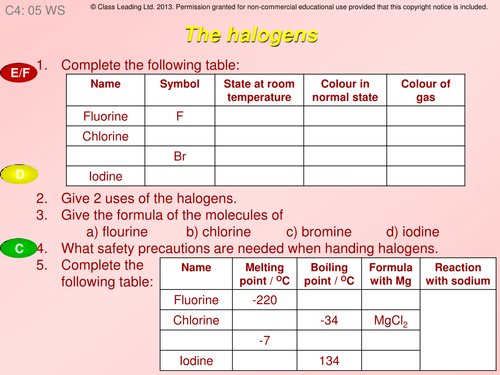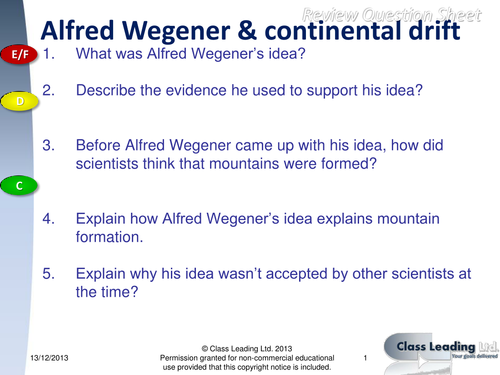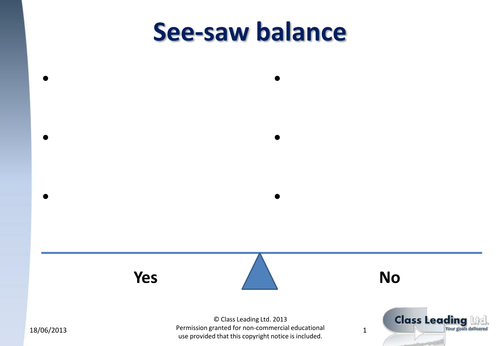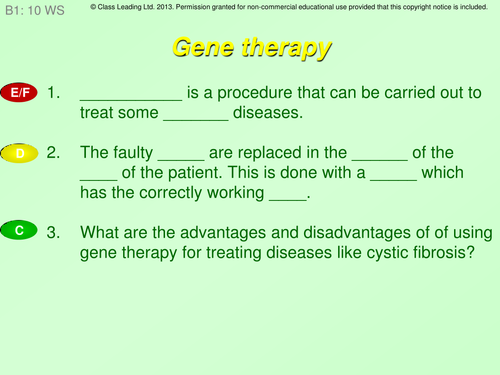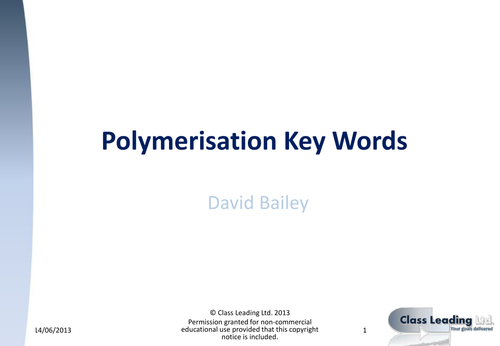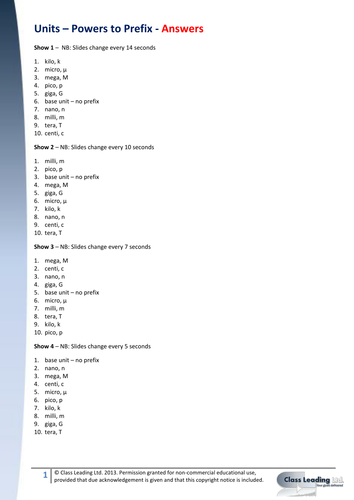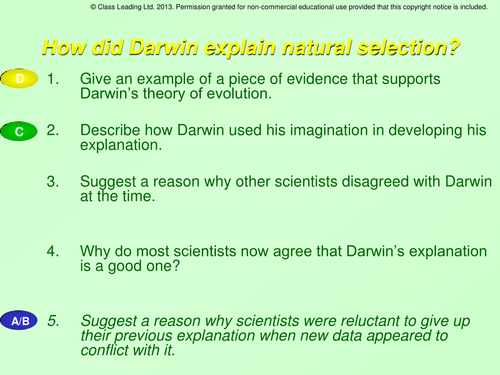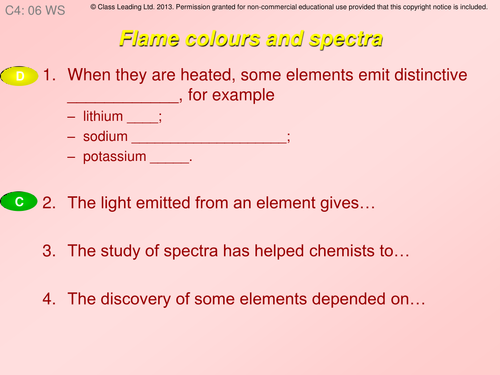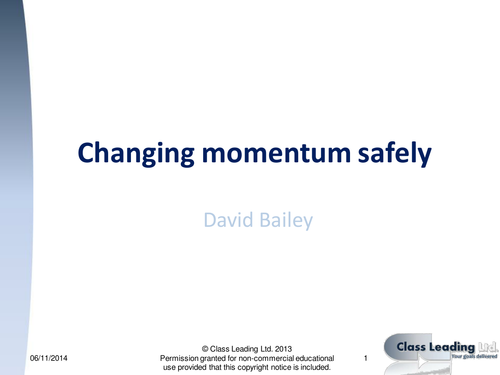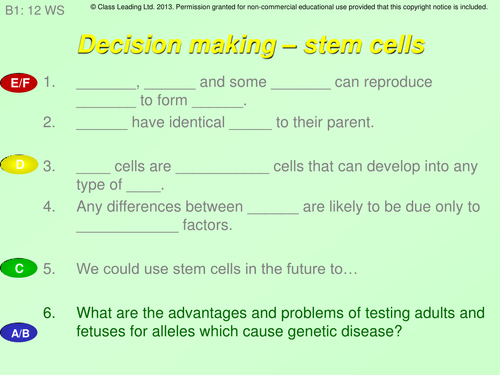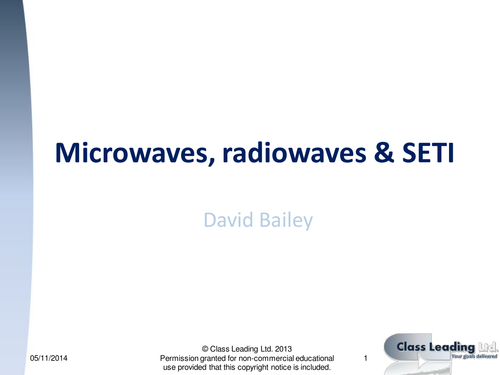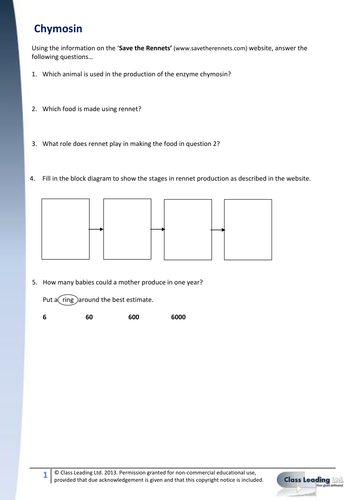314Uploads
260k+Views
194k+Downloads
All resources

The Halogens
This activity contains a powerpoint with graded questions & answers and matching pupil activity sheets, designed to be used at the end of a lesson and/or the start of the next lesson to review previous learning. The questions are based on the previous OCR 21st Century Science Specification unit C4, although could be used with other exam boards.
Clicking through the show reveals answers one a time. These reduce to A5 easily, the ideal size for most pupils. Please note grades are approximate.

Data Handling - Key words
This is a small collection of key words related to data handling. They are designed as a display tool. Remember if laminating to use matt laminates for wall displays to avoid reflection problems.
Key words: range, mean, true value, average, real difference.

Alfred Wegener & Continental Drift - questions
This activity contains a powerpoint with graded questions & answers and matching pupil activity sheets, designed to be used at the end of a lesson and/or the start of the next lesson to review previous learning. The questions are based on OCR 21st Century Science Specification, although could be used with other exam boards.
Clicking through the show reveals answers one a time. There are two slightly different activity sheets for differentiation - one has key words, the other without. These reduce to A5 easily, the ideal size for most pupils. Please note grades are approximate.

Resistance - graded questions
This activity contains a powerpoint with graded questions & answers and matching pupil activity sheets, designed to be used at the end of a lesson and/or the start of the next lesson to review previous learning. The questions are based on the previous OCR 21st Century Science Specification unit P5, although could be used with other exam boards.
Clicking through the show reveals answers one a time. These reduce to A5 easily, the ideal size for most pupils. Please note grades are approximate.

EM waves - graded questions
This activity contains a powerpoint with graded questions & answers and matching pupil activity sheets, designed to be used at the end of a lesson and/or the start of the next lesson to review previous learning. The questions are based on the previous OCR 21st Century Science Specification unit P6, although could be used with other exam boards.
Clicking through the show reveals answers one a time. These reduce to A5 easily, the ideal size for most pupils. Please note grades are approximate.

The greenhouse effect - graded questions
This activity contains a powerpoint with graded questions & answers and matching pupil activity sheets, designed to be used at the end of a lesson and/or the start of the next lesson to review previous learning. The questions are based on the previous OCR 21st Century Science Specification unit P2, although could be used with other exam boards.
Clicking through the show reveals answers one a time. These reduce to A5 easily, the ideal size for most pupils. Please note grades are approximate.

Weighing up arguments - See saw writing frame
This resource is a collection of 6 slightly different see-saw balances that can be used with learners to help them develop the skills to weigh up an argument. The idea is that students will list reasons on both side of an argument (e.g. Should we have Nuclear Power?). They then use this to help make a decision. The scoring column on some sheets allows learners to score each argument out of a maximum of say 3. Add the scores on each side to see which has the stronger argument. This also includes phrases to support a more detailed conclusion. This was inspired by 21st Century Science.

Gene therapy - graded questions
This activity contains a powerpoint with graded questions & answers and matching pupil activity sheets, designed to be used at the end of a lesson and/or the start of the next lesson to review previous learning. The questions are based on the previous OCR 21st Century Science Specification unit B1, although could be used with other exam boards.
Clicking through the show reveals answers one a time. These reduce to A5 easily, the ideal size for most pupils. Please note grades are approximate.

Polymerisation Key words & meanings - Display
This is a pdf showing some key words for polymerisation, including the meaning of the words. They are suitable for printing onto A4 (or scaling up to A3) for display purposes. Remember if laminating them for wall display to ensure that non-reflective laminates are used where possible to ensure maximum readability.
Keywords: monomer, polymer, polymerisation

From potential to kinetic - graded questions
This activity contains a powerpoint with graded questions & answers and matching pupil activity sheets, designed to be used at the end of a lesson and/or the start of the next lesson to review previous learning. The questions are based on the previous OCR 21st Century Science Specification unit P4, although could be used with other exam boards.
Clicking through the show reveals answers one a time. These reduce to A5 easily, the ideal size for most pupils. Please note grades are approximate.

Static - graded questions
This activity contains a powerpoint with graded questions & answers and matching pupil activity sheets, designed to be used at the end of a lesson and/or the start of the next lesson to review previous learning. The questions are based on the previous OCR 21st Century Science Specification unit P5, although could be used with other exam boards.
Clicking through the show reveals answers one a time. These reduce to A5 easily, the ideal size for most pupils. Please note grades are approximate.

Maths Skills - Units - Powers to Prefix Starter
These are a sequence of powerpoint shows designed as an instant engagement task (rolling on screen as learners enter the room for immediate engagement with learning). Learners write down the prefix that represents the power of ten multiplier. They are essentially the same task (with rearranged slides) but get progressively more demanding (as the changeover of slide gets faster) as the numbers in brackets increase. Start the students with (1) and then as they get faster, use the more demanding versions.

Darwin natural selection - graded questions
This activity contains a powerpoint with graded questions & answers and matching pupil activity sheets, designed to be used at the end of a lesson and/or the start of the next lesson to review previous learning. The questions are based on the previous OCR 21st Century Science Specification unit B3, although could be used with other exam boards.
Clicking through the show reveals answers one a time. These reduce to A5 easily, the ideal size for most pupils. Please note grades are approximate.

Flame colours & spectra - graded questions
This activity contains a powerpoint with graded questions & answers and matching pupil activity sheets, designed to be used at the end of a lesson and/or the start of the next lesson to review previous learning. The questions are based on the previous OCR 21st Century Science Specification unit C4, although could be used with other exam boards.
Clicking through the show reveals answers one a time. These reduce to A5 easily, the ideal size for most pupils. Please note grades are approximate.

Changing momentum safely - graded questions
This activity contains a powerpoint with graded questions & answers and matching pupil activity sheets, designed to be used at the end of a lesson and/or the start of the next lesson to review previous learning. The questions are based on the previous OCR 21st Century Science Specification unit P4, although could be used with other exam boards.
Clicking through the show reveals answers one a time. These reduce to A5 easily, the ideal size for most pupils. Please note grades are approximate.

Stem cells - graded questions
This activity contains a powerpoint with graded questions & answers and matching pupil activity sheets, designed to be used at the end of a lesson and/or the start of the next lesson to review previous learning. The questions are based on the previous OCR 21st Century Science Specification unit B1, although could be used with other exam boards.
Clicking through the show reveals answers one a time. These reduce to A5 easily, the ideal size for most pupils. Please note grades are approximate.

Microwaves, radiowaves & SETI graded questions
This activity contains a powerpoint with graded questions & answers and matching pupil activity sheets, designed to be used at the end of a lesson and/or the start of the next lesson to review previous learning. The questions are based on the previous OCR 21st Century Science Specification unit P6, although could be used with other exam boards.
Clicking through the show reveals answers one a time. These reduce to A5 easily, the ideal size for most pupils. Please note grades are approximate.

'Save the Rennets' - reliability of the internet
This activity involves looking at reliability of information found on the internet and encourages students to evaluate this critically in light of the discovery of new information. Students really do engage with the activity and find it a useful learning experience. An activity sheet and guidance sheet are included. Please note that the resource points to two external websites which I acknowledge as external sources of information and as such cannot be held responsible for the content of these websites. It is recommended that these are checked fully before use.

The Solar System - graded questions
This activity contains a powerpoint with graded questions & answers and matching pupil activity sheets, designed to be used at the end of a lesson and/or the start of the next lesson to review previous learning. The questions are based on OCR 21st Century Science Specification, although could be used with other exam boards.
Clicking through the show reveals answers one a time. There are two slightly different activity sheets for differentiation - one has key words, the other without. These reduce to A5 easily, the ideal size for most pupils. Please note grades are approximate.

Reactivity of metals timeline (starter)
Keywords: metal, reactivity, extraction
A short activity (starter?) to encourage higher order thinking and identify relationship between reactivity of metals and their date of first extraction.
Please note that this was originally published a number of years ago as part of the North Yorkshire Success for All project of which I was part and had the pleasure of working with an excellent team of teachers on resource development.
Included is the original briefing sheet and a powerpoint slideshow

